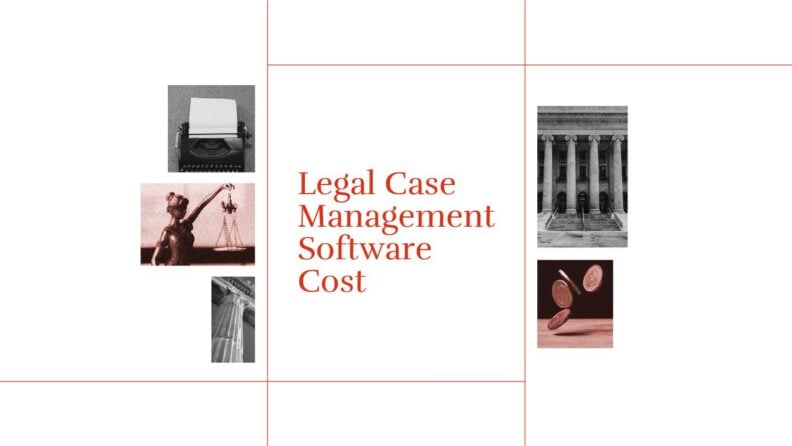Understanding the cost structures of legal case management software is vital, with prices ranging from $20 to $100 per user monthly, heavily influenced by company size and needed features.
Sometimes, the initial price isn't the full story. Consider additional upfront, recurring, and hidden costs like training and data migration before committing to software.
Demonstrating the return on investment of new software is critical; highlight potential cost savings, efficiency improvements, and enhanced client satisfaction to gain buy-in from stakeholders.
When evaluating vendors, ask essential questions about costs, integrations, support, and security to ensure the chosen software meets your firm’s specific needs.
Avoid rushing into decisions; find a solution that blends within your operations, prioritizing user-friendly design and essential features to streamline your legal practice.
When you're managing a legal practice, understanding the costs of legal case management software is key to making informed decisions. You're probably juggling tight budgets while trying to get the best tools for your team. I get it—it's not just about finding software that fits, but also one that fits your budget.
Different vendors have unique pricing structures, and it's not always clear what you'll pay. Some charge per user, while others might have a flat fee. There are hidden costs, too, like training or additional features. You're not alone in wanting to cut through the noise to find straightforward pricing info. Let's dive into what you can expect to pay in 2025 for these essential tools.
How Much Does Legal Case Management Software Cost?
Legal case management software costs $20 to $100 per user per month. Most solutions offer per-user pricing and are often billed annually, though some may provide monthly billing options. For a small business, you might pay on the lower end of the scale, while medium to enterprise-level companies might face higher costs, especially if they require advanced features or additional support.
Legal Case Management Software Pricing Models
Most legal case management software solutions use a subscription-based pricing model, where you pay a recurring fee for access. Other pricing models might include open-source or perpetual license models. Here's a summary of different pricing models you might encounter:
| Pricing Model | How it Works |
|---|---|
| Subscription- Based | You pay a recurring fee for continued access, usually monthly or annually |
| Open-Source | The software is free, but you might pay for support or additional features. |
| Perpetual License | You pay a one-time fee for permanent access to a specific software version. |
| Custom Pricing | Pricing is tailored based on your specific needs and often requires negotiation. |
| Freemium | Basic features are free, but advanced features require a paid subscription. |
Average Cost of Legal Case Management Software
Here's a breakdown of the average costs for different pricing tiers of legal case management software:
| Plan Type | Average Price | Common Features |
|---|---|---|
| Free Plan | $0 | Basic contact management, task tracking, and limited document storage. |
| Personal Plan | $10-$20/user/month | Case tracking, calendar integration, email management, and basic reporting. |
| Business Plan | $25-$50/user/month | Advanced document management, billing and invoicing, client portal, and analytics. |
| Enterprise Plan | $60-$100/user/month | Custom workflows, advanced security features, dedicated support, and integrations. |
Additional Legal Case Management Software Costs to Consider
Beyond the average price point of legal case management software, here are some additional costs to consider in your search:
- Upfront Costs: These are the initial expenses you’ll encounter when using new software. For instance, you might face charges for software licenses or setup fees needed to get the system operational.
- Recurring Costs: You’ll need to budget for ongoing expenses like monthly or annual subscription fees. These are standard for keeping the software’s services active and up-to-date.
- Hidden Costs: Be wary of unexpected expenses that aren’t obvious. These could include charges for additional features or usage beyond your plan’s limits.
- Data Migration: Moving your existing data to a new system can be costly. You might need to hire specialists to ensure that all your data transfers correctly without any loss.
- Training: Getting your team up to speed on the new system may require training sessions. You might need to pay for workshops or bring experts to help your staff learn the ropes.
- Maintenance: Regular system updates and fixing any bugs or issues will incur costs. You might need to allocate funds for support services to keep everything running smoothly.
- Hardware and IT Infrastructure: Implementing the software might require hardware upgrades or new IT systems. This could mean buying new computers or expanding your server capacity to handle the software’s demands.
Proving the ROI of Legal Case Management Software
I know firsthand how challenging it can be to demonstrate the value of new tools to those who hold the purse strings. You’ve likely faced skepticism when proposing a change, especially when adopting new technology like legal case management software. Here’s how you can effectively make your case:
- Understand Their Concerns: Address your stakeholders’ worries, like costs or data security. Prepare clear responses showing how the software will tackle these issues.
- Show Cost Savings: Calculate potential savings by reducing manual work and errors. Present these figures to highlight how the software pays for itself over time.
- Highlight Efficiency Gains: Explain how the software can streamline workflows and save time. Use examples of tasks that will be faster and more accurate.
- Demonstrate Improved Client Satisfaction: Share how better case management leads to happier clients. Use testimonials or case studies showing successful outcomes.
- Emphasize Compliance Benefits: Point out how the software helps maintain compliance with legal standards. Provide examples of how it minimizes risk and prevents penalties.
- Leverage Vendor Support: Mention the training and support offered by the software provider. Explain how this reduces the burden on your IT department.
- Use Real-Life Examples: Share stories from other firms that have successfully implemented the software. This can build trust in its effectiveness.
- Prepare for Questions: Anticipate questions your stakeholders might ask and have well-thought-out answers ready. This shows you’ve done your homework.
With these strategies, you’re ready to confidently advocate for the adoption of legal case management software at your firm.
Questions to Ask Legal Case Management Software Vendors
Choosing the right legal case management software can be overwhelming, especially when looking for a solution that fits your unique needs. I've navigated through the options before, and I know how crucial it is to ask the right questions. Here are some essential questions to consider when talking to vendors:
- What are the total costs, including any hidden fees or additional charges?
- How does the software scale as my practice grows?
- Can it integrate seamlessly with my existing tech stack?
- What are the ongoing maintenance requirements, if any?
- What kind of support is available, and is there an additional cost for premium support?
- How will the onboarding process work, and what resources will be provided to help my team get up to speed?
- Are there customization options to tailor the software to my specific needs?
- How secure is the software, and what measures are in place to protect client data?
- Can I access the software remotely, and does it have mobile capabilities?
- What is the vendor's policy on updates and upgrades?
Armed with these questions, you’re ready to start evaluating legal case management software vendors. Don't forget to ask about their experience working with firms of your size and in your practice area.
Legal Case Management Software Pricing: Final Thoughts
When considering legal case management software, it's crucial to factor in both pricing and implementation. You want a solution that fits your budget but also integrates smoothly into your daily operations. Choosing the right vendor is about more than just cost. Look for providers with solid support and training options; these can make or break your experience.
Imagine your team struggling with a clunky interface—no one wants that. Instead, opt for software that's intuitive and meets your specific needs. For example, if document management is your pain point, focus on vendors excelling in that area.
Ultimately, the right choice aligns with your workflow and helps you manage cases more efficiently. Don’t rush the decision; take the time to evaluate demos and ask for references. Your future self will thank you for it.
Methodology: We’ve been testing and reviewing legal practice software since 2023. We’ve tested more than 2,000 tools for different legal practice use cases and written over 1,000 comprehensive software reviews. Our pricing guides and software reviews are backed by extensive research and data from a large number of software vendors, users, and testers.
Disclaimer: As researchers and independent reviewers, our aim is to share information on typical software pricing structures to help our readers contextualize their purchase decisions. We are not providing financial advice, and encourage you to consult with a financial specialist as needed for your unique business case.
Legal Case Management FAQs
Here are some questions people also ask me about legal case management software pricing or legal case management software functionality more generally:
What features do legal practice management tools offer?
Legal practice management software helps law firms with calendaring, task management, case management solutions, and case management systems. It supports client communication, lead management, new clients, and improves the client experience. Tools like dashboards, custom fields, templates, and legal calendaring boost law practice efficiency.
What tools help automate law firm workflows?
Legal tools use automation, document automation, e-signatures, and online payments to streamline work. Features like payment plans, time tracking, time entries, trust accounting, expense tracking, document sharing, intake forms, real-time updates, and messaging simplify tasks and billing.
What are the top legal case management platforms?
Platforms like Clio, MyCase, and PracticePanther offer case management, calendaring, task tracking, e-signatures, document automation, and client communication. Clio leads in trust accounting, MyCase enhances the client experience, and PracticePanther adds custom fields and automation, all with monthly subscriptions.
Is cloud-based legal software worth it?
Cloud-based and SaaS tools cut costs with app and mobile app access, real-time updates, and document sharing. Monthly subscriptions offer affordability, and firms benefit from easy access, scalability, and fewer IT hassles.
How do legal CRMs and tools improve productivity?
Legal CRMs support caseload tracking, functionality insights, and client records. Webinars provide learning support, while monthly subscriptions offer cost-effective access to these essential legal tools.
Need expert help selecting the right Other Software?
If you’re struggling to choose the right software, let us help you. Just share your needs in the form below and you’ll get free access to our dedicated software advisors who match and connect you with the best vendors for your needs.
What's Next?
For more legal insights and resources, subscribe to our newsletter and join a community of innovative legal practitioners shaping the future of law.



